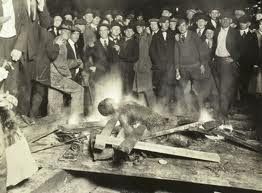
so i went to a lecture yesterday about this book that just came out from an Alumni from my school. the book is entitled The Dark End of the Street: Black Women, Rape and Resistance--A New History of the Civil Rights Movement from Rosa Parks to the Rise of Black Power by Danielle L. McGuire.
i found the title of the book very interesting, which is why i went to the lecture. turned out to be a very informative and eye-opening, and maybe if i wasn't broke, i would have bought the book.
during the lecture, and i supposed in the book as well, she details the ways in which Black women had to deal with sexual abuse at the hands of white men. black women were raped, sexually abused and harassed at alarmingly common rates on their way to and from church, the store, and most often, work (which was almost always in a white person's home, on the white side of town). the assailants were mainly police officers and bus drivers and males in the households in which they worked.
and while i found it surprising, there were actually a large number of women that reported these assaults to the police. McGuire found hundreds of police reports that were filed, witness testimonies, and statements from the victims.
this is all well known, or not surprising to most people who know the dynamic historical relationship between Black women and white men in this country. the purpose of the book, however, was to show that the civil rights movement was not a movement started, organized, or funded by Black men.
at some point, after the cases of Gertrude Perkins and Recy Taylor had garnered more outrage from these women that were assaulted on a daily basis, they began organizing against this treatment. they were always helped by men, pastors most notably, but the point being that these every day Black women who started this - they organized pastors to each other, held small boycotts, and eventually financed similar protests by selling baked goods. eventually, this led Rosa Parks (one of the activists who worked early on against the sexual abuse) to become what most of us have heard was the catalyst for the movement.
maybe i'll have more if/when i get her book, but i thought this was a very interesting point which seems to be well backed. but why do we constantly only hear of the civil rights movement through male names? why had i never heard of Dorothy Height until she died? what about Edith Savage and Fannie Lou Hamer? why can we list more names of men apart of the struggle than of women? is this the patriarchy of our system (and/or of the European system) finding its way into our own plight?
on another note, why is this book being written by a white woman? does anyone else feel slightly disappointed when books like these that expose histories forgotten or unknown are researched and written by white people?? how different would this book be had it been written by a Black woman or man? is this even a valid question??
comment. think. criticize.

















































